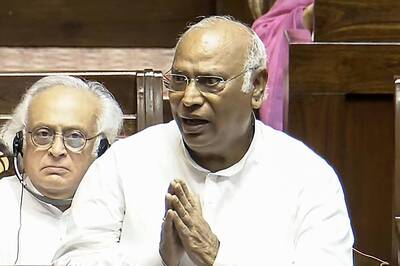
views
New York: Osama bin Laden, the world's most wanted fugitive who spent his last days being sidelined from al-Qaeda despite having created the terror outfit, was probably betrayed by one of his jealous wives and his deputy.
It seems all was not well in Osama bin Laden's safe house in Pakistan towards the end, the New York Times reported saying there was "poisonous mistrust" between Osama's three wives, with one of them being accused of betraying him to US intelligence.
A new twist to the mystery of how Osama got a shelter in a Pakistani cantonment town for over six years, before he was gunned down by US SEALs and his last days have come from a retired Pakistani brigadier Shaukat Qadir, who carried out his own investigations, the Times said.
Besides the intense jealousies among his wives, Qadir claims that Osama had been sidelined by his outfit. "al-Qaeda decided to retire him in 2003 as he was mentally senile having picked up some degenerative disease from 2001."
Last August, the retired brigadier, retraced the steps of the American commandos who stormed through the corridors of Osama's hide-out on May 2 last year.
Qadir, who claims that his army background was crucial to get army chief Ashfaq Parvez Kayani's approval to make two visits to bin Laden's house, says he has no evidence, but offers a tantalising image of a frail man betrayed through one of his wives in an al-Qaeda plot.
The Brigadier claims that his theories are his own, but admits he may have been manipulated by the army and ISI who are still fending off suspicions of complicity in sheltering bin Laden.
Qadir says that the terror mastermind used to stay on the top floor, sharing his bedroom with his favourite and youngest wife. The trouble began when his eldest wife showed up and moved into the bedroom on the floor below.
The mistrust grew so much that one of bin Laden's older wives pointed fingers at his "favoured wife" for betraying him.
"As a former soldier, I was struck by how badly the house was defended," Qadir told the New York Times. "No proper security measures, nothing high-tech in fact, nothing like you would expect."
Qadir claims that bin Laden's fifth and youngest wife Amal Ahmed al-Sadah told Pakistani interrogators that her husband underwent a kidney transplant in 2002. "In the cramped Abbottabad house, tensions erupted between Sadah, described as 'the favoured wife' and Khairiah Saber, an older woman who occupied a separate floor," Qadir said.
Bin Laden's youngest wife also told interrogators that her husband shaved his beard and disguised himself as an ailing Pashtun elder as he leapfrogged between safe houses across northwestern Pakistan, eventually regrowing the beard after finally settling in the Abbottabad house in 2005.
Qadir's investigation "offers tantalising possibilities about bin Laden's circumstances and the suspicions that drove relations between Pakistan and US to the brink," the NYT said. A former Obama administration official agreed with some of Qadir's findings, like a claim that bin Laden and his deputy, Ayman al-Zawahri, suffered serious disagreements that led to the al-Qaeda chief being pushed to the sidelines.
"This divide grew with time, and remained a source of tension until the day bin Laden died," the official told the paper, speaking on the condition of anonymity. "His role had been diminished."
Qadir's probe lasted eight months and took him to the tribal belt and Afghanistan to interview old tribal contacts. He says he also spoke with officials of Pakistani intelligence agency ISI.
The Times said despite bin Laden's death, many of the toughest questions remain. Who helped him stay on the run? How did the CIA track him down? And, perhaps most important, did Pakistan's generals know he was living a stone's throw from their leading military academy?
Pakistan's government says the answers will come from an official commission of inquiry, led by a Supreme Court judge, that has been working since May. Yet few believe the Abbottabad Commission, as it is known, will succeed. Publication of the commission's findings, originally scheduled for December, has been repeatedly postponed, and critics of the government smell political pressure to tone down its findings.
On the night of February 25, the local authorities in Abbottabad sent bulldozers to demolish bin Laden's house after nightfall, erasing a painful symbol of an embarrassing episode for the military.



















Comments
0 comment